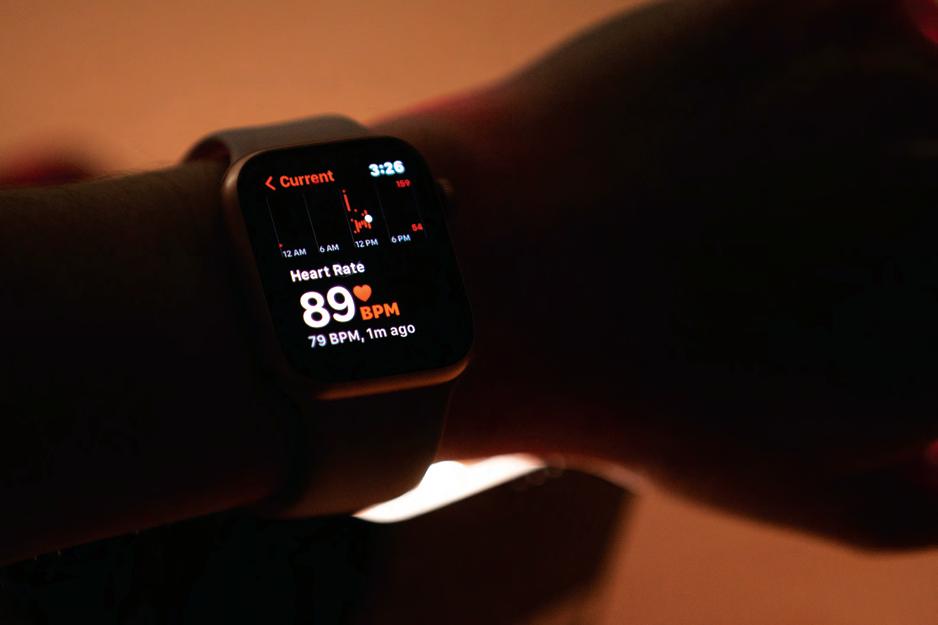
11 minute read
Some UI students use fitness trackers, despite data inaccuracies
A UI cardiologist explains inconsistencies of wearable fitness tracking devices.
IC Human Rights Commission leadership push community engagement
Advertisement
Marco’s Grilled Cheese to open new locations

Grilled cheese enthusiasts can look forward to two new Marco’s Grilled Cheese locations in Coralville and on First Avenue in Iowa City.
Taking the next step Iowa baseball right-handed pitcher Ty Langenberg is confident about making the jump from a Sunday to Friday night starter for the Hawkeyes this season. Page 8

Upcoming
Traversing through the smoke
Despite self-imposed and external hardships, female firefighters overcome challenges each day to better their communities, with support systems backing them every day.
Sophia Mamakos News Reporter
As wearable fitness trackers become a popular way to measure everyday activity, University of Iowa students are continuing to use the devices, despite worries from health care officials.
Fitness trackers, popularized by the companies Apple and Fitbit, are wearable devices or devices with computer applications that record a person’s daily physical activity. The trackers also relay health and fitness data like the number of calories burned, heart rate, steps, and breathing.
About one in five U.S. adults regularly wear a fitness tracker, the Pew Research Center reported in 2020.
UI Hospitals and Clinics Cardiologist Linda Lee said the devices cannot be fully trusted. Lee said she often answers questions regarding fitness-tracking devices and the information they gather.
“Easily five or six people a week will come to the office with their device or with a long list of information that they’ve gleaned from their device,” Lee said. “A lot of the time, they’re confused about what the information means or what they should be paying attention to.”
Lee said the most common concern about these devices is the heart rate measure, which depends on the person’s age, fitness level, the medicines that they take, or medical diagnoses.
“The other issue with heart rate is that there are heart rate alarm parameters that can be activated on some of these devices,” Lee said.
Ellie Gilbert, a UI first-year student and
equity in Iowa City.
The commission’s chair and vice chair spoke with The Daily Iowan about their plans to improve racial
Jack Moore News Reporter
The newly elected Iowa City Human Rights Commission chair and vice chair are pushing for improvements to affordable housing and grant programs for Iowa City residents and businesses.
The Iowa City Human Rights Commission elected Roger Lusala, the president and CEO of the Mayor’s Youth Empowerment Program, as its chair and Sylvia Jons as vice chair Jan. 24.
The Iowa City City Council appoints nine members for the Human Rights Commission to serve for three years. The commission’s responsibility is to educate the public on illegal discrimination and civil rights and advise policy changes to the Iowa City City Council.
Lusala said he was emboldened to join the commission in 2021 after the killing of George Floyd in May 2020.
“I wanted to be more on the front end of really pushing for change and implementing change,” Lusala said.
The Human Rights Commission has been working on its own strategic plan, which is separate from the city council and is currently being implemented. The plan has three areas of focus to improve community engagement.
“We have so many nonprofits in Iowa City addressing racial equity and social justice issues, so we want to be a resource for those organizations,” he said. “We want those organizations to come to us so we can collaborate on how we can really make our city a better place to live.”
The commission also plans to work on improving their process of allocating grants to groups serving social justice and racial equity. The commission conference later that day, including Iowa men’s wrestling head coach Tom Brands’ urging the addition, the dramatic participation increase of girls and women’s wrestling across the state, and a recently settled Title IX lawsuit.
“Before COVID, we had been watching the explosive growth of girls’ and women’s wrestling,” Barta said. “We had been keeping an eye on it. Frankly, Tom was in my ear three, four, five years ago saying, ‘C’mon, boss, let’s go. Let’s get women’s wrestling added.’ We were not ready to do that yet, but we were watching it.”
About 700 girls wrestlers participated in an unsanctioned state meet in 2022, showing the explosion of girls wrestling across the state.
The Iowa Girls High School Athletic Union sanctioned girls wrestling for 2022-23 in January 2022 — just four months after Iowa announced a women’s wrestling team. According to The Des Moines Register, over 1,800 girls registered for the first-ever sanctioned girls’ wrestling season in 202223. Barta did say, however, that Hawkeye Athletics wouldn’t have added a new women’s sport if it wasn’t for a Title IX lawsuit. Four women’s swimmers brought a Title IX lawsuit against the university in September 2020 after Barta announced the athletics department was going to cut women’s swimming along with men’s swimming, tennis, and gymnastics at the end of the 2020-21 academic year in August 2020.
The four swimmers claimed the university didn’t comply with Title IX — a federal law that mandates equal educational and athletic opportunity for women in schools that receive federal funding. In the lawsuit, the swimmers claimed women made up 53.56 percent of the UI student body but only received 50.77 percent of the athletic opportunities.
The university settled the lawsuit in September 2021. The settlement mandated Iowa athletics both reinstate women’s swimming for a minimum of seven years and add a new women’s sport. Iowa chose women’s wrestling. “If not women’s wrestling at Iowa, where else, right?” Barbara Burke, senior women’s administrator and deputy director of athletics, said. “... It really made a lot of sense that this would be a great sport, and maybe we can be the driver in getting other Power Five Division I institutions to add the sport for women. I think it’s a sport that’s going to continue to grow.”
Finding the right coach
While Burke said Iowa wasn’t necessarily looking for a coach with NCAA experience, she wanted someone who had experience with women’s wrestlers and a passion that rivaled fans in the state.
Because Iowa was setting the description for a Power Five women’s wrestling head coach, Burke said, the Hawkeyes were looking specifically for experience with women’s wrestlers.
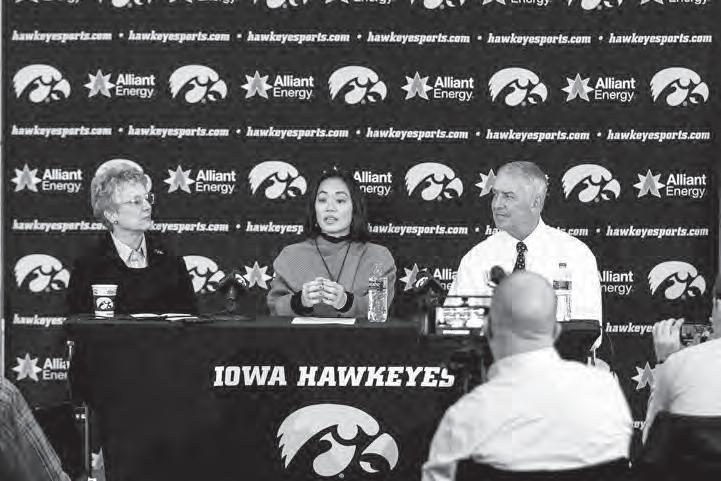
Chun has ample experience with women’s wrestlers along with familiarity with the university and Carver-Hawkeye Arena. She almost tried to join the Hawkeye men’s wrestling team while considering if she wanted to attend Iowa in 1999.
“Wrestling was a new sport to me, and I just wanted to dive into, like, who’s the best, and I wanted to be a part of it,” Chun said. “... Obviously, I never reached out to the coach or anything. I just thought I could show up and be like, ‘Hey, can I get a space on the mat or maybe a manager or something?’”
Ultimately, Chun knew she wasn’t going to get the wrestling experience she wanted at Iowa. So, she became one of the first women’s wrestlers on scholarship at Missouri Valley College.
She made the senior women’s national team while she was still competing at Missouri Valley.
Chun was also a two-time university national champion and placed fourth at the University World Championships in 2003.
But one of Chun’s brightest moments as a wrestler came in what she thought was an out-ofbody experience at Carver-Hawkeye Arena. She qualified for the London Olympics at a sold-out Carver in 2012.
“That pit, that Carver floor, I don’t know, like, engulfed me and took me to another place that I didn’t know where I was,” Chun said of her experience. “ … I wasn’t present, and I won, and I don’t know how … I don’t know if it was pressure because I wasn’t even there.”
The 48kg freestyle wrestler won a bronze medal at the London Games in 2012 to go along with her fifthplace finish in Beijing in 2008.
Chun moved into coaching after her storied wrestling career. She started as the West Virginia men’s wrestling program’s operations assistant then moved on to work as an assistant coach for the U.S. women’s national team in Colorado Springs, Colorado, from 2017-21.
While there, she worked with former Hawkeye wrestler Terry Steiner to guide the women’s national team to 17 world and four Olympic medals.
But Chun was already planning to leave her post in Colorado Springs before she heard of the Iowa women’s wrestling head coaching position. She was going to move back to Marshall, Missouri, to coach at her alma mater and reunite with her longtime partner.
When Iowa announced its women’s wrestling program, however, she had a decision to make. She could either end eight years of long distance with her partner, who is a Missouri Valley College professor, or put her name in to coach the first-ever Power Five women’s wrestling program.
“It was finally going to be like, ‘Oh, hey, after eight years we’re gonna be in one place.’” Chun said. “And then Iowa announced, and then I really had a lot of conversations with my significant other — hard conversations. Because it was something that we’re both looking forward to, as far as being the same place, but it was also like, ‘How do we pass an opportunity like this?’”

But Chun and her partner decided the opportunity in Iowa City was too good to let go without trying. So, Chun put her name in to become Iowa’s first women’s wrestling coach in October 2021.
“I was a little hesitant just because I wasn’t sure,” Chun said. “That was, like, resolidifying the direction that I was taking our relationship to long distance again. But as I was going through the process, interviews or Zoom interviews, I started getting competitive again. My competitive juices came out.”
Chun was officially announced as Iowa’s first women’s wrestling coach on Nov. 18, 2021, giving her an opportunity to build a new legacy in Iowa City.
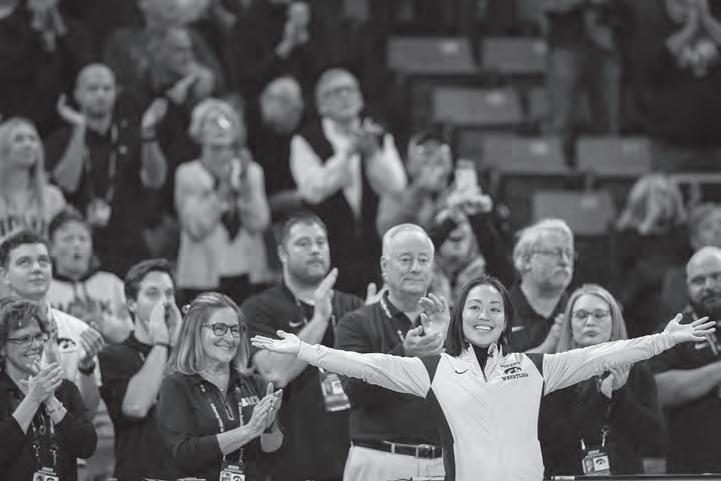
While she’s still doing long-distance with her partner, her move to Iowa has slightly closed the gap — what was a 10hour drive from Colorado Springs to Marshall became a 4.5 hour trip from Iowa City.
Building a team

As a former national women’s wrestling coach, Chun didn’t have any experience with NCAA compliance policies. All coaches and athletes need to be versed in NCAA rules and regulations, including required documentation and institutional compliance.
Chun had to work through a steep learning curve to switch her mindset from national team coaching to collegiate coaching. The first step she tackled was recruitment. “There’s a lot of roles in recruiting,” Chun said. “Working with national teams, there’s competitions that determine who you work with, right,
The Daily Iowan
1999
Chun considers going to Iowa to join the men’s wrestling team, instead joins Missouri Valley College’s women’s wrestling squad.
2003
Chun places fourth at University World Championships.
2012
Chun qualifies for London Olympics at Carver-Hawkeye Arena, earns a bronze medal at the Games.
November
2021
Chun is named Iowa women’s wrestling program’s first-ever head coach.
2008
Chun gets fifth place at 2008 Beijing Olympics.
2017-21

Chun works as an assistant U.S. women’s national team coach in Colorado Springs, Colorado.
November 2023 like world team trials or national Olympic trials. Whoever’s top three you work with, it’s not like you’re recruiting them to train.”
Iowa women’s wrestling will start competing in duals at Carver-Hawkeye Arena.
The team chats during a break in practice at Carver-Hawkeye Arena in Iowa City on Nov. 28, 2022. Chun emphasized the importance of keeping lighthearted moments present throughout practice. “I think women think they want that grind,” Chun said. “But I think if they have that current grind 24/7 they will burn out a lot quicker.” Chun said the team knows when to flip the switch from joking around to getting serious and ready to wrestle.
But Chun still succeeded in recruiting the first Power Five athlete just five days after she was officially announced as head coach.
Kylie Welker, who committed on Nov. 23, 2021, was the No. 1 pound-forpound recruit at the time of her commitment and had worked with Chun before as a junior and senior world championship competitor.
“Being the first of the first program, it was honestly like an honor,” Welker said. “It was really exciting when coach Chun told me she wanted me to be the first signee … I think I chose Iowa mainly because when I came here, it just felt right. I love the atmosphere, and obviously, Iowa’s known for wrestling. So, what better place to wrestle than at the University of Iowa?”
Welker wasn’t planning to go to college before Chun offered her a spot on Iowa’s team — she wanted to go to a regional training center to pursue her Olympic dreams. But Welker thought Chun and Iowa women’s wrestling would give her the same Olympic opportunity while also helping her grow in different areas.
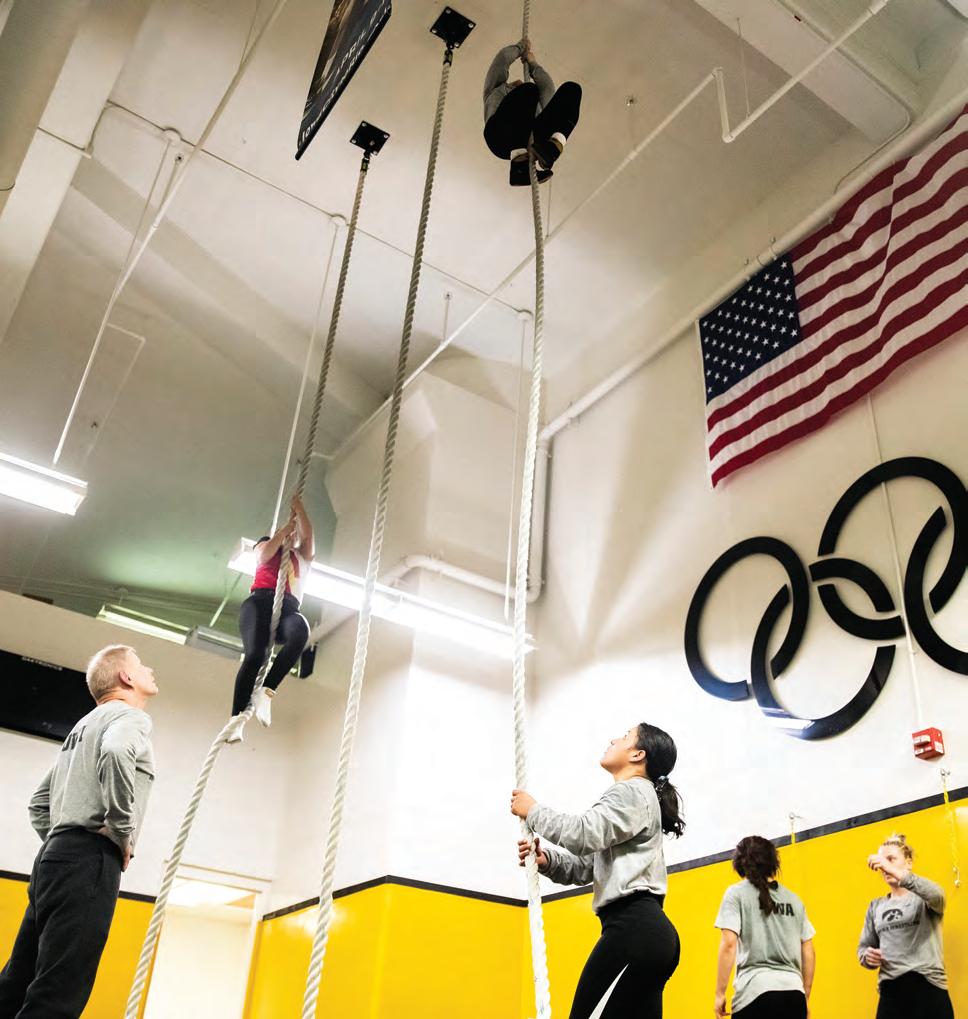
While Chun was building her roster, she also had to find a coaching staff up to the task of pioneering a Power Five women’s wrestling team.
She first found Gary Mayabb, manager of USA Wrestling Greco-Roman programs from 2017-22 and a longtime USA Wrestling coach, in May 2022. Two months later, Chun added Tonya Verbeek, a former wrestler and coach for the Canadian National Team.
Neither Chun, Mayabb, or Verbeek had NCAA experience when they started at Iowa, but the three work through problems together.
“She’s very inclusive,” Mayabb said about Chun. “With her leadership style, she’s not worried about the fact that she has to be a leader, she knows she is. What she does is she takes in the best parts of everybody else’s leadership, in- cluding student-athletes. To help build the program, it’s been everybody. All hands on deck, if you would. Everybody’s got a hand in it.”
And while they may not train with their athletes during strength and conditioning, Mayabb and Verbeek join Chun those three mornings a week in the Carver training room.

While the Hawkeye women’s wrestlers are helping build the team from the ground up, Welker said they’ve also hit some roadblocks, including shared mat space with the men’s team and a small locker room.
“At the beginning of the year, our coach used this analogy and put this picture of these construction workers literally building a plane as a plane is flying,” Welker said. “And I’m like, ‘That’s literally us because we’re building this program.’ But we’re also part of this program before it’s even like completely up and running. So, it’s definitely cool to see, and it’ll be cool to see how far this program gets and how much more we can build women’s wrestling.”
Iowa is currently building a wrestling training center to give more space to both its men’s and women’s programs. The Goschke Family Wrestling Training Center, which is located next to Carver-Hawkeye Arena, will open ahead of the 2024-25 season.
Iowa has 15 women’s wrestlers on its roster with plans to increase to 28 next season, Mayabb said. The Hawkeye women’s wrestlers are training in Iowa City and competing unattached before starting dual competition next season.
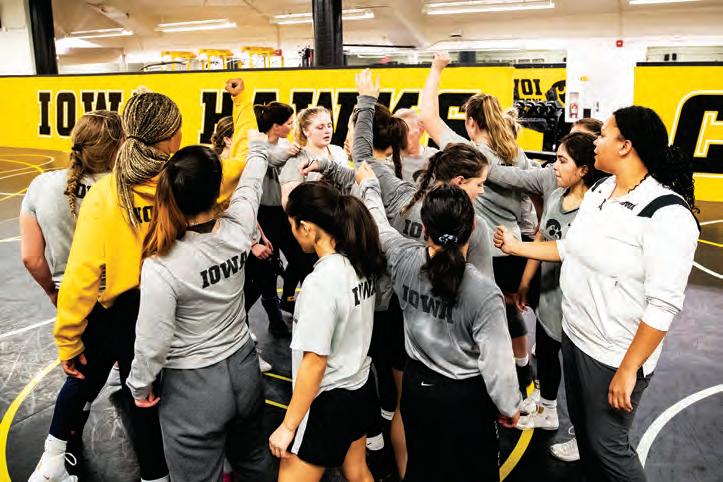
“It’s crazy good,” Mayabb said. “It’s special; we have really good young women. They’re driven. They know what they want. They operate extremely well together, and they have close-knit bonds.”
The Hawkeye coaches host two practices a day, and the first is from 9:3011:30 a.m. The nightly practice, which usually starts at 6:30 p.m., is optional for the wrestlers, and Chun said about 50 percent come in for individual work with the three coaches.
Associate head coach Gary Mayabb observes wrestlers climb ropes during practice at Carver-Hawkeye Arena in Iowa City, on Nov. 28, 2022. Mayabb, with 52 years of coaching under his belt, was named associate head coach on May 13, 2022. Chun said the program is able to function better with help from Mayabb and assistant coach Tonya Verbeek. “My coworkers are awesome to work with,” Chun said. “Both are crazy passionate about wrestling.” Chun said Mayabb is great with culture building and Verbeek has good leadership skills.
Between practices, Chun, Mayabb, and Verbeek have staff meetings, calls, and emails to fill their time. While it amounts to a 12-hour day every day, Chun said she wouldn’t have her coaching experience any other way.

“We could divide and conquer in the sense of, ‘Coach Mayabb, you take this day; Tonya, you take this day; and I take the night,’ or whatever, and rotate, but I don’t know, we just love what we do,” Chun said. “We enjoy being on the mat. Those moments, those evening individual moments are times that we really get to know the athlete.” chloe-peterson@uiowa.edu
Iowan
The team huddles up at the end of practice at Carver-Hawkeye Arena in Iowa City on Nov. 28, 2022. The team’s official schedule and dual meets start next year, but wrestlers are currently competing in tournaments and earning titles.





